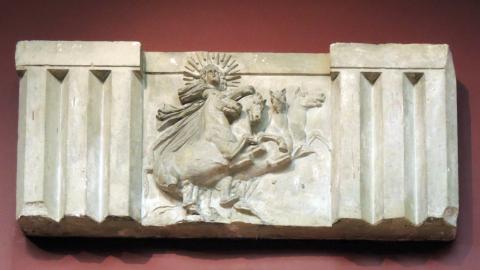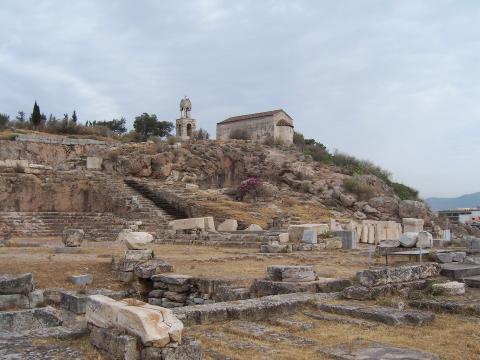Quantus incēdit populus per urbēs
ad novī lūdōs avidus theātrī;
quantus Ēlēum ruit ad Tonantem,840
quīnta cum sacrum revocāvit aestās;
quanta, cum longae redit hōra noctī
crēscere, et somnōs cupiēns quiētōs
Lībra Phoebēōs tenet aequa currūs,
turba sēcrētam Cererem frequentat845
et citī tēctīs properant relictīs
Atticī noctem celebrāre mystae:
tanta per campōs agitur silentēs
turba. pars tardā graditur senectā,
trīstis et longā satiāta vītā;850
pars adhūc currit meliōris aevī:
virginēs nōndum thalamīs iugātae
et comīs nōndum positīs ephēbī
mātris et nōmen modo doctus īnfāns.
hīs datum sōlīs, minus ut timērent,855
igne praelātō relevāre noctem;
cēterī vādunt per opāca trīstēs.
quālis est vōbīs animus remōtā
lūce cum maestus sibi quisque sēnsit
obrutum tōtā caput esse terrā?860
stat chaos dēnsum tenebraeque turpēs
et color noctis malus ac silentis
ōtium mundī vacuaeque nūbēs.
Notes
Three similes describe the great number of shades of the dead (838–49). The Chorus imagines a procession of people of all ages processing into the terrible silent darkness of the Unederworld (850–63).
838–49 These “magnificent lines” (Fitch 1987) are structured through triple anaphora of quantus/quanta (lines 838, 840, 842), all three of which anticipate tanta in line 848. Translate: “as large as the crowd of people that… as large as… as large as… so large is the crowd that…”
839 novī lūdōs … theātrī: it is possible that Seneca has in mind a particular event: for instance, he might possibly have witnessed the games that accompanied Claudius’ rededication of the Theater of Pompey (described by Suetonius, Claudius 21.1). But it is just as likely that Seneca wishes only to make a general reference to the various public spectacles that were a regular part of Roman life. avidus: “eager,” modifies populus in the previous line. The postponement of the adjective emphasizes it and suggests what the crowd is eager for: the lūdōs that avidus is juxtaposed with in the text.
840 quantus: supply populus from 838. Ēlēum … Tonantem: the Olympic Games were a festival in honour of Jupiter at Olympia, in the region of Elis; he is thus the “Elean Thunderer.” As often, Latin poetry uses an adjective where we would use a possessive noun (“of Elis”). Note also 844 Phoebēōs … currūs, “the chariot of Phoebus.”
841 quīnta … aestās: the Olympic Games were held every four years in the summer. Latin uses so-called “inclusive reckoning” (counting both the first and the last unit in a span of numbers), yielding a number one higher than in English.
842 quanta: modifies turba in 845. The subject of the third and final simile is delayed by the long temporal cum clause in 842–44. 845 sēcrētam Cererem reveals it to be the Eleusinian Mysteries.
842–43 cum longae redit hōra noctī / crēscere: “when the season returns for the night to grow long” (Fitch 2018). hora = “season, time of year” is poetic (LS hora II); it would usually be followed by a gerund rather than an infinitive (as in Ovid, Fasti 3.241). The Greater Eleusinian Mysteries were celebrated around the time of the fall equinox, when night began to be longer than day. longae is thus a proleptic adjective, referring to what the nights will become as the season progresses.
Details
The Mysteries were intimately connected with death, and thus return our focus to what the chorus is describing (the great number of spirits in the Underworld). To reinforce this focus, the simile begins with the coming of a longa nox, an appropriate metaphor for death (compare the perpetua nox in Catullus’ famous poem to Lesbia, 5.6).
844: “and Libra holds Phoebus’ chariot balanced.” At the fall equinox, the Sun, as it moves through the zodiac, is in the constellation Libra. The constellation can therefore be thought to “hold” the sun “in balance,” because night and day are of an equal length (aequa is predicative, describing how Libra holds the Sun). This is the time of the Eleusinian Mysteries. The image of balance is particularly appropriate for the constellation, which was seen as a set of weighing scales. Phoebēōs … currūs: the Sun and the Moon were commonly represented riding chariots in Classical art and literature. See, for example, this metope from the Temple of Athena at Ilion.
845 turba: the Mysteries were held at the Telesterion in Eleusis, a large hall that could hold about 3,000 people. sēcrētam Cererem frequentat: as with 840 Ēlēum … Tonantem, here the goddess is used as a metonymy for her festival.
846 citī … properant: the subject is Atticī … mystae in the next line, and the verb takes the complementary infinitive celebrāre. Although citus, -a, -um originates as the perfect passive participle of cieo, ciēre (“to move, rouse”), in poetry it most often simply means “quick” or “quickly.”
Details
Lines 846–47 seem to describe the procession from Athens to Eleusis that was one of the more visible parts of the Mysteries. Fitch (1987) notes that the procession itself was quite slow, but suggests that the hurry of the initiates might be when they leave their homes early in the morning to join the beginning of the procession.
tēctīs … relictīs: ablative absolute (AG 419): the initiates leave their homes in Athens to join the procession to Eleusis.
847 Atticī … mystae: “Attic initiates.” The rare first declension noun mystēs, -ae is masculine, like its Greek equivalent μύστης. Athens was located in the territory of Attica. noctem celebrāre: the procession to Eleusis ended with an all-night vigil.
848–49 tanta … turba: after the elaborate series of similes, this brief summary is striking, ending with the emphatic enjambment of turba: the crowd of the dead is very great indeed.
848 agitur: in contrast with the eager crowds that rushed to the festivals on earth, the spirits of the dead are passively swept along: “the passive verb suggests human helplessness” (Fitch 1987).
849 tardā … senectā: ablative of manner used, as often, without cum (AG 412). Seneca smooths the transition from one idea to the next by giving this line a sound similar to the previous line:
tanta per campōs agitur silentēs
turba. pars tardā graditur senectā
850 trīstis et … satiāta: both modify 849 pars in the previous line.
851 meliōris aevī: genitive of description (AG 345). The “better age” is youth.
852 thalamīs iugātae: “joined in marriage.” The Greek noun thalamos is sometimes used in Latin poetry with its literal meaning of “inner chamber” or “bridal chamber,” but often means, by metonymy, “marriage.”
853 comīs nōndum positīs ephēbī: boys would let their hair grow long until puberty, at which point they would “lay aside” or “relinquish” their hair by cutting it. Usually an ephebus is a male in late puberty, but here it must refer to younger boys.
854 mātris et nōmen: translate et before mātris. The baby name for “mother” in Latin is mamma, -ae, formed by reduplicating the syllable ma- (as in almost every Indo-European language).
855–56 hīs … noctem: prose order: hīs sōlīs datum [est] relevāre noctem igne praelātō, ut minus timērent. datum est = “it has been granted, it is allowed,” with a following infinitive expressing what is allowed. igne praelātō: “with torches carried in front (of them),” ablative of means AG 408. In Rome, funerals for adults normally took place during the day, but funerals for infants occurred at night by torchlight. Seneca extends this idea into the afterlife and amplifies the pathos, imagining that torches light the path of infants to relieve their fear of the dark.
858 quālis est vōbīs animus: vōbīs is dative of possession (AG 373): “what is your state of mind?” (Fitch 2018).
858–59 remōtā / lūce: ablative absolute (AG 419) with temporal sense.
859 sibi quisque: “each one for themselves,” emphasizing the intensely personal nature of each shade’s experience, when they realize that they are dead and buried in the earth. sibi may be classified as an ethical dative (AG 380) or dative of disadvantage with obrutum esse (AG 376).
860 obrutum … caput esse: an indirect statement after sēnsit. By synecdoche, caput refers to the entire person. To emphasize the oppressive sense of burial, Seneca surrounds caput with both the verb obrutum … esse and the ablative tōtā … terrā.
861 stat: governs the five nominatives that follow, which are joined in polysyndeton to suggest “that there are infinite aspects of the Underworld’s grimness” (Fitch 1987). chaos dēnsum: chaos regularly refers to the Underworld in poetry. It is a term imported from Greek, where it originally described the “formless conglomeration of matter” (Fitch 1987) that was imagined to have existed before the universe was formed. But because the primordial universe was sometimes imagined instead as an empty space, chaos may also mean “vast emptiness,” which creates a striking oxymoron with dēnsum.
862 color noctis malus: a variation on the preceding tenebraeque turpēs.
863 ōtium: “inactivity.” Seneca strikingly describes the stillness of the Underworld as “leisure.” Seneca explores the complex concept of ōtium throughout his philosophical writings (he even composed a treatise Dē Ōtiō). Leisure could be used by the philosopher to pursue a virtuous life, but its misuse by lazy and dissolute people led to a kind of living death: ōtium sine litterīs mors est et hominis vīvī sepultūra (Epistles 82.4). vacuaeque nūbēs: seemingly an odd climax to the Chorus’s description of the Underworld. But Fitch (1987) points out that “this phrase both evokes and negates the fertile cycle of nature, in which rain clouds play their part”: the clouds of the Underworld are “empty” of rain, like the shades of the dead are empty of life.
Vocabulary
incēdō incēdere incessī incessus: to go, march; happen
lūdus lūdī m.: play, game, joke; show
avidus –a –um: eager; greedy; hungry
theātrum theātrī n.: playhouse, theater
Ēlēus –a –um: in/of Elis, Elean, Olympian
ruō ruere ruī rūtum: to rush
tonat tonāre tonuit: to thunder
quintus –a –um: fifth
sacrum sacrī n.: a holy thing; sacrifice, rite; a sacred thing, temple
aestās aestātis f.: summer
quiētus –a –um: at rest, inactive, peaceful
Lībra –ae f.: The Balance/Scales (constellation)
Phoebēus –a –um: pertaining to Phoebus, Phoebean
sēcrētus –a –um: separated, secret, hidden
Cerēs Cereris f.: Ceres; grain
frequentō frequentāre frequentāvī frequentātus: to visit often, to frequent; to crowd, throng
cieō ciēre cīvī citus: to move, rouse; excite; invoke
Atticus –a –um: Attic, Athenian
mystēs –ae m.: an initiate to a secret rite
silēns –entis: still; quiet, noiseless
gradior gradī gressus sum: to step, walk, go
senecta –ae f.: old age
satiō satiāre satiāvī satiātum: to fill, satisfy, sate
melior melius: better
thalamus –ī m.: marriage bed; bedchamber; marriage
iugō iugāre iugāvī iugātus: to yoke; join together, bind
ephēbus –ī m.: a youth man, ephebe
īnfāns –antis: a baby
minus: less
praeferō praeferre praetulī praelātus: to carry in front of; place before, prefer; show
relevō relevāre relevāvī relevātus: to lift up; lighten, alleviate
vādō vādere vāsī vāsum: to go, rush
opācus –a –um: shady, dark
removeō removēre removī remōtus: to move back, put away, remove
obruō obruere obruī obrutum: to overwhelm; bury, cover
chaos (only in nom. and acc. sing.) n.: void, boundless space; the Underworld
dēnsus –a –um: thick; close, compact
silēns –entis: still; quiet, noiseless
nūbēs nūbis f.: cloud



